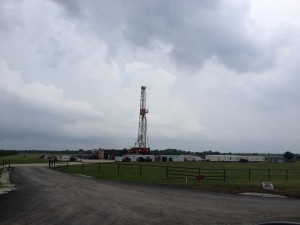Last week I spoke to a group of landowners at the Western Navarro Bobwhite Recovery Initiative Spring Meeting in Blooming Grove. Blake Alldredge planned a great meeting at a wonderful location and I enjoyed the opportunity to attend. On Tuesday, I was in Simonton to present on leasing issues at the Upper Gulf Coast Ranch Exposition. I appreciate all of the hard work that Greg Kaase put in to get this program put together and enjoyed the chance to visit with the producers. To those of you joining from these presentations, welcome!
* Two Petitions for Review Filed in Edwards Aquifer Authority v. Bragg. For those of you keeping up with the happenings in the EAA v. Bragg case, both sides have filed briefs seeking review of the appellate court decision by the Texas Supreme Court. The EAA argues five points: (1) the Bragg’s claim was barred by the statute of limitations; (2) the court of appeals erred in suggesting that takings claims against EAA accrue only after the authority denied a permit application; (3) a Penn Central taking cannot occur when the regulations’ economic impact on the claimant is not determined; (4) the court of appeals used the wrong date of taking an incorrect valuation method; and (5) if a taking did occur, the state should be liable rather than the EAA. [Read petition for review here.] The Braggs seek review of three issues: (1) Should the value of the property taken be valued at the date of the permit denials as was held by the court of appeals, or at the date of trial?; (2) Should just compensation be determined based on the difference between the value of the property before and after a taking as the court of appeals determined, or based upon the market value of the water taken apart from the land?; and (3) Did the permit denials constitute a physical and/or per se categorical taking by physically depriving the Braggs part of their property? [Read Bragg’s petition here.]
* EPA Considering Fracking Disclosure Regulations. The EPA is currently considering the need for federal regulations governing the disclosure of fracking fluids across the US. Currently, many states require such disclosures be made (subject to some exceptions, for example, trade secrets) and some companies voluntarily disclose the substances used in the fracking process. [Read article here.] The EPA has not yet decided whether it will draft such a rule, but is currently seeking public comment to determine whether this type of federal regulation is needed. [Read EPA press release here.]
* Earthjustice Asks EPA to Regulate Fracking Emissions. The environmental group Earthjustice filed a petition with the federal Environmental Protection Agency this week seeking regulation of air emissions by oil and gas wells utilizing fracking under the Clean Air Act. The petition refers to reported health issues occurring for residents in the Eagle Ford Shale that they blame on emissions. Currently, state laws regulate air pollution from fracking, rather than federal laws passed by the EPA. The EPA will now review the petition. [Read article here.]
* Unintended Consequences of Fracking on Drug Trafficking. And interesting article discusses the unintended consequences of fracking on drug trafficking from Mexico to the United States. The article reports that the additional roadways and infrastructure that was developed due to the increased oil production in South Texas have provided additional pathways for drug traffickers to travel. On the other hand, however, the increased number of oil field workers in the area have increased the number of eyes watching for suspicious activity and providing assistance to Border Patrol agents. [Read article here.]
* USDA Announces Position on CRP and Lesser Prairie Chicken. The Southwest Farm Press reports that the USDA has announced farmers and ranchers implementing Conservation Reserve Program (CRP) practices will not be subject to additional regulations as a result of the lesser prairie chicken being listed as a threatened species. Landowners involved in CRP programs should consult with their local FSA office to ensure compliance and develop conservation plans. [Read article here.]
* Four Estate Planning Documents Everyone Should Have. The Wall Street Journal ran an article this week discussing four estate planning documents everyone should have: a will, a durable power of attorney, a healthcare power of attorney, and a living will. The article outlines each of these documents in simple terms and explains their importance. [Read article here.]
Ranchers Leasing Workshop is now available on demand to be taken anytime at your own pace. To register click here.












